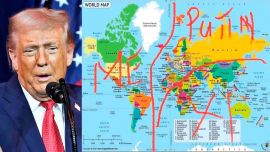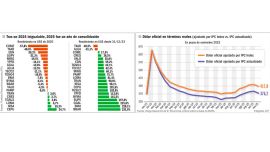The disappearance of Santiago Maldonado has stirred up emotions and summoned worrying memories of the past. As the lies were spun, it was woundingly obvious from the start of this saga that the whereabouts of Santiago and his fate were becoming less and less of a human concern. Both the government and the opposition have revealed themselves to be more concerned about the political consequences and less interested in the human being who should have been the centre of attention.
It took a storm of public anger and marches by thousands and thousands of concerned citizens in Buenos Aires and throughout the country to prompt the government to mobilise a massive search operation.
I was horrified when I heard the same words uttered that I heard during the dictatorship. Once again good people sought to diminish the enormity of an individual disappearing by denying it had happened or trying to explain it away. On the other hand, it was equally disturbing to learn that it was more important for people opposed to the government to attribute Santiago’s absence to a deliberate act by the authorities and to charge that he was the victim of a “ forced disappearance.”
I was dragged back to the past when I heard good people express their irritation with the cause to advance human rights, recalling a time when human rights were dirty words.
It is certainly true that human rights have been politicised over the past decade, but the trials brought the light of justice to an area of darkness.
Human rights matter and they should be paramount in the statecraft of all democracies, particularly Argentina, which has an international reputation to preserve. This country is exemplary because, using the existing judicial system, the highest military officers and de facto presidents were put on trial for crimes against humanity.
Unfortunately, the present government has not acquired any credit and has scant credibility when it comes to human rights. Even the president has seemed to scoff at the human rights organisations and has referred to human rights as “a racket.”
The failure of the present government to commit to human rights helps to explain why so much fury was aroused by its inept handling of the disappearance of Santiago Maldonado, allegedly during a clash between the Gendarmerie (Border Guards) and Mapuche militants.
As I was preparing this agonised column shortly before midnight, half-listening to the Codigo Politico programme on television, I stopped writing. I listened to the television as a married couple appeared, saying they had come forward to say that they picked up a young man on August 22 while driving near Esquel, the area where Santiago Maldonado was last seen. They said they recognised the man from the photographs that they have been seeing on the television. They said he told them that he had been beaten and robbed.
I thought how wonderful it would be if, as the couple suggested, there is an innocent explanation for his disappearance. His reappearance would not only appear to be little short of miraculous, it would act like a cleansing wind, sweeping away all the filth that has swamped the airwaves, the media and the social networks over the past month.
It would expose the malice and hypocrisy vented by opposition politicians. It would reveal the lies told by supposed witnesses of the “forced disappearance” of Santiago who pointed the finger at the Border Guards. And it would serve as a lesson to the government that there is a price to pay for not paying enough attention to human rights.
* Former editor of the Buenos Aires Herald( 1968-1979)




















Comments